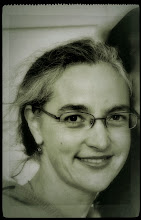"I want to go home," says Sam.
"Why?" I ask.
"I don't know. I just do," he says.
We return home, and both boys run to the backyard. The door hangs wide open behind them. With fixed gazes and hips set, they aim and throw rocks at a chosen target east of the pond. Over and over stones are hurled, then the boys run to retrieve them. I no longer watch the game protectively to interrupt if they threaten to pelt each other by mistake.
I stand quietly at the kitchen window. A bowl of blueberries sits on the table beside me with a bag of canning jars that someone mysteriously left on my step. The wind lifts tall willow branches into a dance of light, silvery leaves bending and stretching in the afternoon sun. For a moment, I choose not to think of what's for dinner, or anything else. For a moment, I only feel.
A surge of bittersweet belonging fills me. The boys are rooted here, a sense of place. This grounding feels healthy, coherent, integral. Yet, this land, too, shall pass. They will move on, with or without me. They will come home to me wherever I am, or I will bring this sense of belonging back to them when I come to visit.
Rooted. Countless generations behind me and one at the pond just ahead. The ache fills me. I have been alive lately with what I perceive as the rich reality of my relations. Colorful language, fiery forthrightness, and purposeful independence are the trademarks of my known tribe of origin. I masquerade as a post-modern hippie, but the Kool-Aid and jello that stained my cheeks as a child sitting riverside reveals my backwoods pedigree. I did not eat nutritional yeast until I turned thirty.
Part of me is becoming proud of what I once perceived as a "shadow" in my raising. My compassion stretches into celebration, a fierce devotion to the soul that pulsed in my mother and father's lineage despite poverty, alcoholism, and abuse.
My grandmother tells a story of visiting her grandmother in a hospital after her grandmother had fallen from a ladder picking cherries. The eighty-something woman had broken her neck. "What are you doing here?" she demanded of my grandmother from the hospital bed. "Those cherries are ripe! You get out there and get picking!"
I was raised on wild venison and duck meat, cheap grocery hamburger, corn from the garden, and canned green beans. Food translates to the soul of me. It is who I am. In everything my parents killed, harvested or touched I tasted the generations of hands that bore me into this world. The cans from the food bank, sheepishly accepted, tasted like wounded pride, and that, too, shaped me.
"Where did you get your faith in God?" Seda asked me through the kitchen window last night.
"Adversity, I guess. Funny thing to ask through the window," I said.
There are parts of my roots that the children barely recognize. Parts of Seda's roots as well. Where once I wished to hide what unfurls deep beneath me, I now seek to share openly but gently. Roots are, in their right, sacred. They can be damaged.
The understory is alive in me. Nothing to outrun, outrace, or cast off. It is my path into light.
There, my boys throw rocks under the sun. In our protected wilds, a small city yard consumes them. They belong.
And so do I with them.
Calendar and Current Events
14 years ago

1 comment:
Hi girl,
Coming to terms with roots can be turning up gold coins mixed in with the old skeletons. My father once said, "don't go digging into the past; you're sure to find something awful." Hm. I didn't take this to heart, for the awfulness was pretty visible: alcoholism, addiction to gambling, wild people who were manic/depressive, stern people who beat each other with buggy whips, children who fled with hate in their hearts, burned farms, divorce, starvation and split families.
But the gold, now, there's something. Hardship before us and gold in our hearts, in our language, in the way she says "fixin'" or "wallerin", in the way he looked out at the horizon, knowing all it's boundaries. Behind these veils were poets from Scotland, doctors from Ireland, wild people who fled kings and conquerors to fight Natives and each other.
I long to give the gold to my granddaughter who will have the red hair and freckles that mark our people every so often with some of that past, like flowers popping out of the leaves of black hair and thin faces.
When I go back to CO, I feel the pull of the mountains, the roots there, the feeling of the air and the wind in the pines, sighing my heart still.
Who could not believe in god when faced with nature on one hand and the torment of a torn family on the other.
Eleanor Cameron says that writers are born out of the fraying of childhood if they turn into that rich land within or escape to the woods, the river, with Koolaid or with a hidden stash of cherries.
We are still children, deep in the inner lands, deep in the world, trying to hold onto the threads of a frayed family to twist them into a new generation.
Let us look in the window, K. We will cherish the inner land and the light will shine out on our faces in the darkness. We shall hear the singing from you by the fire and rejoice that you were there to light yourself and be visible.
hugs
me
Post a Comment